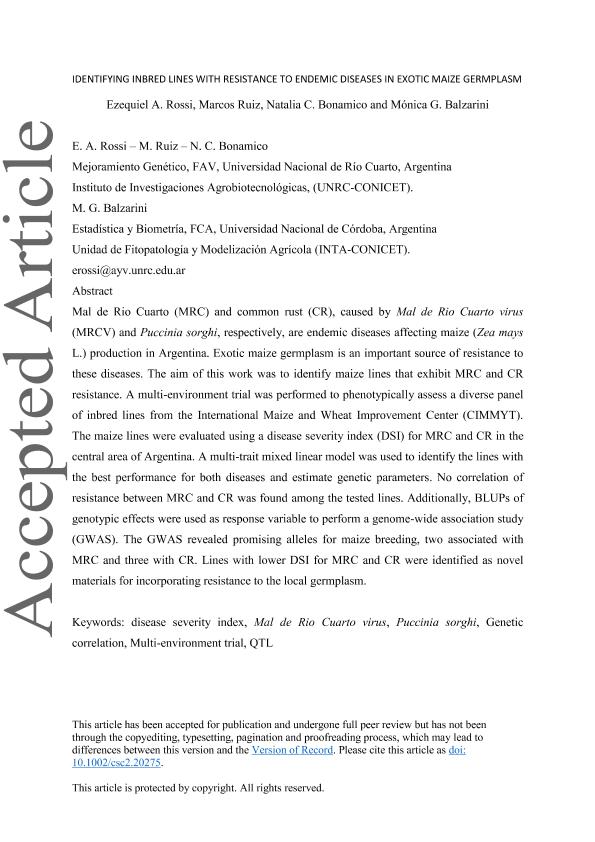Artículo
Identifying inbred lines with resistance to endemic diseases in exotic maize germplasm
Fecha de publicación:
20/11/2020
Editorial:
Crop Science Society of America
Revista:
Crop Science
ISSN:
0011-183X
e-ISSN:
1435-0653
Idioma:
Inglés
Tipo de recurso:
Artículo publicado
Clasificación temática:
Resumen
Mal de Rio Cuarto (MRC) and common rust (CR), caused by Mal de Rio Cuarto virus (MRCV) and Puccinia sorghi, respectively, are endemic diseases affecting maize (Zea mays L.) production in Argentina. Exotic maize germplasm is an important source of resistance to these diseases. The aim of this work was to identify maize lines that exhibit MRC and CR resistance. A multienvironment trial was performed to phenotypically assess a diverse panel of inbred lines from the International Maize and Wheat Improvement Center (CIMMYT). The maize lines were evaluated using a disease severity index (DSI) for MRC and CR in the central area of Argentina. A multitrait mixed linear model (MLM) was used to identify the lines with the best performance for both diseases and estimate genetic parameters. No correlation of resistance between MRC and CR was found among the tested lines. Additionally, best linear unbiased predictions (BLUPs) of genotypic effects were used as response variable to perform a genome-wide association study (GWAS). The GWAS revealed promising alleles for maize breeding, two associated with MRC and three with CR. Lines with lower DSI for MRC and CR were identified as novel materials for incorporating resistance to the local germplasm.
Archivos asociados
Licencia
Identificadores
Colecciones
Articulos (INIAB)
Articulos de INSTITUTO DE INVESTIGACIONES AGROBIOTECNOLOGICAS
Articulos de INSTITUTO DE INVESTIGACIONES AGROBIOTECNOLOGICAS
Citación
Rossi, Ezequiel Alejandro; Ruiz, Marcos; Bonamico, Natalia Cecilia; Balzarini, Monica Graciela; Identifying inbred lines with resistance to endemic diseases in exotic maize germplasm; Crop Science Society of America; Crop Science; 60; 6; 20-11-2020; 3141-3150
Compartir
Altmétricas




